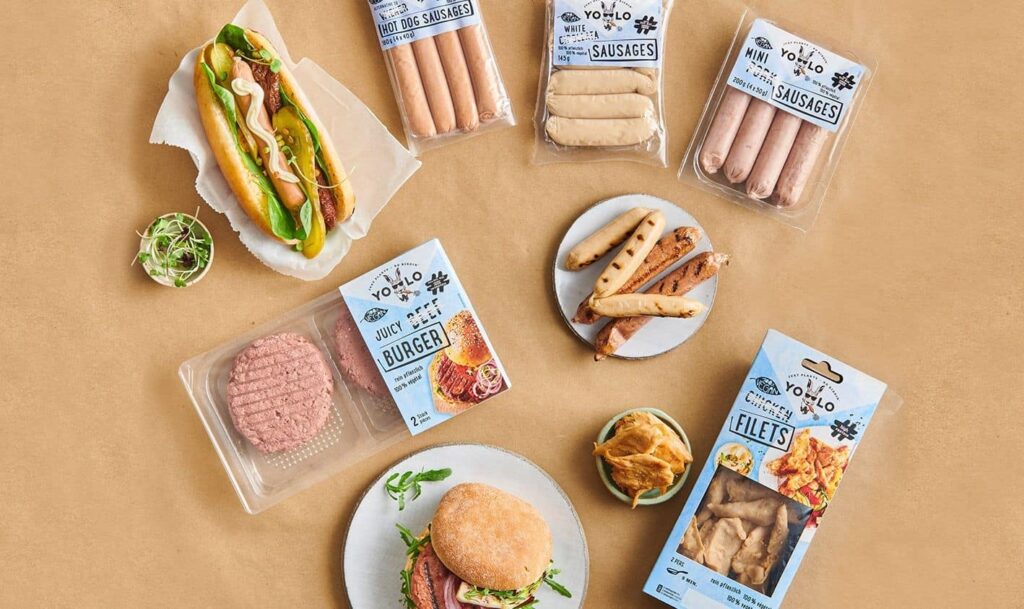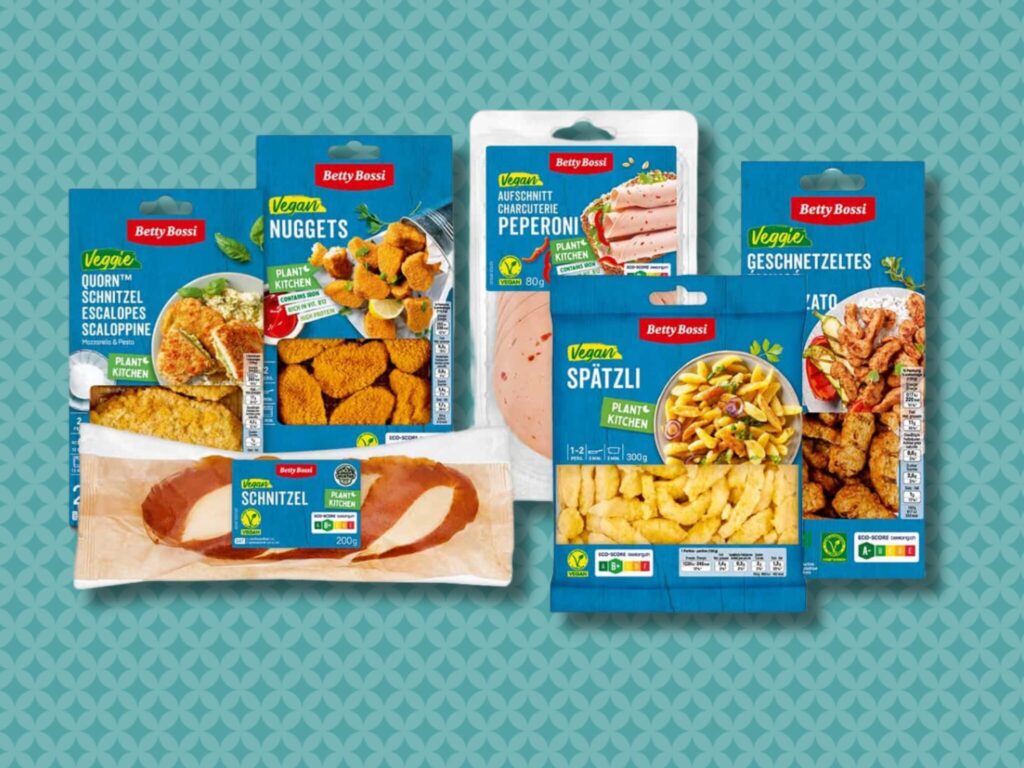6 Mins Read
A new survey by Coop Switzerland has revealed that over half of Swiss consumers have eaten plant-based alternatives to meat, dairy and seafood – a demographic it labels ‘substitarians’ – while nearly six in 10 are reducing their consumption of animal-source foods, making it a country centred around flexitarians.
Swiss retail and wholesale giant Coop Switzerland has unveiled a 2,221-person survey exploring the consumption habits of the country’s population, which found that meat consumption has declined, while a subcategory of consumers called ‘substitarians’ – or those who eat plant-based meat products – has emerged.
Coop’s Plant Based Food Report suggests that 58% of people are consciously avoiding animal-derived foods like meat, dairy and eggs several times a month, which makes them fit into the flexitarian category (comprising 61% of women and 56% of men). And while a high number of consumers still consume these products at least several times a week – 65% eat cheese, 62% meat and 55% milk – the year-on-year intake is still down by two, three and three percentage points, respectively.
Who are Switzerland’s substitarians?

Over a quarter of respondents (28%) eat plant-based meat, seafood and dairy several times a month, while another 28% do so on occasion, making 56% of the Swiss population substitarians. In fact, 51% have been consuming vegan analogues for at least four years, a share that has increased by three percentage points from last year.
The substitarian demographic has an almost equal gender split, comprising 29% of women and 27% of men (the former’s share is down by two points, the latter’s is up by four). And of these consumers, most skew young and come from urban areas in all the different language-speaking regions. Among those under 29, 42% enjoy vegan alternatives several times a month, while for people over 60 – who actually follow a flexitarian diet most often – only 19% are substitarians.
There’s also a trend of reduction over elimination here: 65% of respondents combine plant-based and animal-derived products in the same meal, whether that’s consciously or unconsciously, indicating an opportunity for blended meat products in the country. It would be one way to continue the increased uptake of plant-based alternatives – the number of respondents who haven’t tried a meat analogue reduced from nearly half (49%) in 2021 to 44% in 2023.
What are the drivers of veganism in Switzerland?

For Swiss people, climate change is the most important factor in the consumption of plant-based products – this reason was cited by 67% of flexitarians, 63% of substitarians, 68% of vegetarians, and 66% of vegans. Interestingly, while this driver remains top in the first three categories, it suffered a 15-point decline among people who are already vegan, coming in second behind animal welfare (69%).
This was the second-biggest motivating factor for vegetarians (67%) and flexitarians (54%) as well, though it came in third place for substitarians (50%), marginally beaten by health (51%). Health was third on the list of priorities for flexitarians (53%), but fell behind other factors for those already on a meatless diet. For vegans and vegetarians, it’s the fifth-most pertinent reason to eat plant-based alternatives, behind ethical motivations and a lack of desire to eat meat.
Meanwhile, price has become an increasingly crucial consideration, after a couple of years of high inflation due to the elevated cost of living globally. Its importance has climbed by 11 points for vegetarians and six points for vegans, and is cited by 19-24% of Switzerland’s population as a reason to eat more plant-based alternatives.
In terms of the climate change metric, this is most relevant to young flexitarians, with its value increasing by 10 points over last year. For people aged 45 and above, health is the primary component. Health is also by far the most important thing for people in Ticino, the Italian-speaking region of Switzerland, being cited almost twice as much as the other factors. This makes sense, considering that health is the top driver for the intake of plant-based alternatives in Italy, with 49% of respondents to the EU Smart Protein 2023 survey selecting it
Which products and labels work best?

Coop Switzerland’s research shed light upon people’s attitudes towards product labels. The term ‘vegan’ is attractive to just a quarter of Swiss consumers, but ‘plant-based’ appeals to about half of them. This is perhaps because the former is associated with ‘expensive’, and the latter more strongly linked to health (both have connotations of ‘trendy’ and environmental protection).
In terms of products, the overall plant-based dairy category is still dwarfed by the livestock industry, capturing just 3.7% of the total share. But from Coop’s own sales data, vegan alternatives accounted for 17% of total dairy sales, meaning one in six milks bought at its stores is plant-based. Oat milk dominates this category, responsible for 58% of total alt-milk sales. This is followed by soy (18%) and nut milks (16%).
In terms of meat analogues, schnitzels rule the roost, followed by shredded/sliced meats and sausages. Burgers, once a category leader, have dropped off over the last two years – despite that fall, they have experienced a 279% growth in sales since 2018. Similar numbers exist for shredded meats (+304%), meatballs (+293%) and charcuterie items (+204%) in that period.
Overall, more and more vegan substitutes are being bought at Coop Switzerland, prompting nearly 70% of respondents to say they’ll be either maintaining or upping their intake of these products in five years’ time. This rises to 83% for 15- to 29-year-olds, and 93% for substitarians.

These figures have likely inspired Coop Switzerland’s new consolidated own-label vegan range, Betty Bossi Plant Kitchen (which combines cookbook publisher Betty Bossi’s CPG arm with the retailer’s private-label brands Délicorn and Yolo). The supermarket claims to offer over 2,200 vegetarian products – more than 1,900 of which are vegan – with upwards of 100 meat and fish analogues, 50 plant-based milks, 40 vegan yoghurts, and about 30 dairy-free cheeses.
“The new branding emphasises that vegetarian and vegan alternatives are now part of the normal diet,”, said Coop brand manager Ivana Guggisberg. “Meat alternatives are no longer niche products, but are bought by a broad section of the population.”
Switzerland is also home to one of the most well-funded alt-meat companies in Europe: Planted Foods, which has raised over $100M and features an extensive range of chicken SKUs, pulled meats and kebabs. Additionally, Coop recently welcomed TiNDLE Foods’ vegan chicken products in 440 stores, marking a Swiss market debut for the Singapore-based brand in time for Veganuary. These developments – plus Coop’s survey – pinpoint Switzerland as a country receptive to future food producers.




